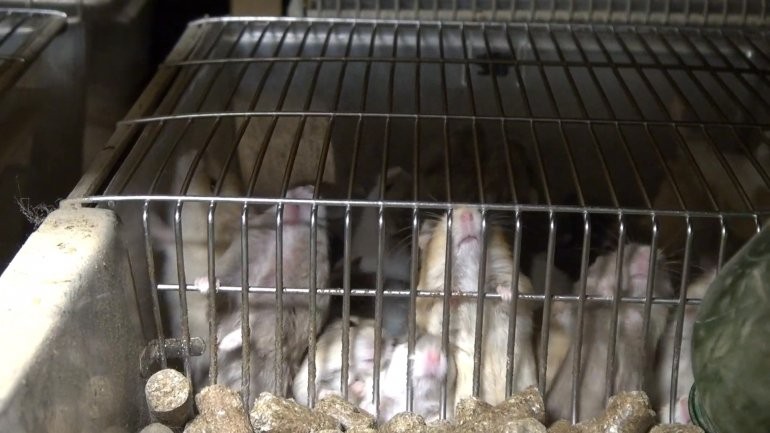When you walk into a pet store and see those adorable hamsters in their glass enclosures, have you ever stopped to wonder where they actually come from? The journey of a pet hamster from breeder to store shelf is often more complex, and sometimes darker, than many pet lovers realize. Understanding this supply chain is crucial for making informed decisions about pet ownership and supporting ethical practices.
The Dark Reality of Rodent Mills
Unfortunately, a significant number of hamsters sold in chain pet stores originate from places known as “rodent mills.” These are large-scale breeding facilities that prioritize profit over the well-being of the animals. Similar to puppy mills for dogs, rodent mills house hamsters, along with other small animals like gerbils, mice, and rats, in overcrowded and unsanitary conditions.
Female hamsters in these mills are often relentlessly bred, leading to exhaustion and health issues. The enclosures are typically small, dirty, and lack proper enrichment, causing immense stress to these naturally active and curious creatures. This stressful environment, combined with poor breeding practices, can lead to various health problems in the hamsters.
PETA (People for the Ethical Treatment of Animals) conducted an undercover investigation into a rodent mill in Europe, revealing disturbing conditions. Their findings shed light on the suffering endured by animals bred for the pet trade. You can read more about their investigation here.
Animal Welfare Act and Legal Loopholes
While animal welfare is a growing concern, and laws like the Animal Welfare Act 2006 exist in some regions to protect animals, rodent mills often operate in ways that skirt these regulations or benefit from a lack of enforcement. The Animal Welfare Act, for example, mandates that animal owners and keepers ensure the welfare needs of their animals are met, including:
- A suitable environment
- A suitable diet
- The ability to exhibit normal behaviors
- Appropriate housing with or apart from other animals
- Protection from pain, injury, suffering, and disease
Facilities that fail to meet these needs can face penalties, including fines, imprisonment, and bans on animal ownership. However, the sheer scale and often hidden nature of rodent mill operations make consistent oversight and enforcement challenging. You can find more information about the Animal Welfare Act at www.gov.uk/guidance/animal-welfare.
Ethical Breeders: A Responsible Alternative
In stark contrast to rodent mills, ethical breeders prioritize the health and well-being of their hamsters above all else. These breeders operate on a much smaller scale and are dedicated to responsible breeding practices. Ethical hamster breeders ensure:
- Spacious and clean enclosures for hamsters, separating them when not mating to prevent aggression and provide personal space.
- Opportunities for exercise, including providing wheels (when babies are not present).
- Bedding for burrowing, allowing for natural behaviors.
- Responsible breeding practices to avoid over-breeding and allow females to recover between litters.
- Detailed record-keeping of bloodlines to prevent inbreeding, which can lead to genetic weaknesses and health problems.
You can learn more about ethical breeding practices here.
Genetic Health Concerns: The Impact of Inbreeding
The mass breeding and often indiscriminate practices in rodent mills have a detrimental effect on the genetic diversity and overall health of hamsters. Inbreeding, a common consequence of rodent mill operations, reduces genetic variation, making hamsters more susceptible to hereditary diseases and shortening their lifespan.
In the wild, natural selection helps to eliminate weaker individuals, ensuring that only the healthiest animals reproduce. However, in rodent mills, this natural process is bypassed. Hamsters with genetic predispositions to health problems are still bred, perpetuating and even amplifying these issues in domesticated hamster populations. This can result in pet store hamsters being more prone to conditions like wet tail, skin issues, neurological problems, and even brachycephalic (short-faced) conditions.
Adopt, Don’t Shop: A Compassionate Choice
Given the ethical concerns surrounding rodent mills and the potential health issues associated with hamsters from these sources, choosing adoption is a significantly more compassionate and responsible approach. Numerous hamsters in shelters and rescue centers are waiting for loving homes. Adoption not only gives a deserving hamster a second chance but also helps to reduce the demand for rodent mill hamsters.
Before considering purchasing a hamster from a pet store, please explore adoption options in your area. You can find a list of adoption and rescue centers for hamsters here. By choosing to adopt, you can make a positive impact on the lives of hamsters and contribute to a more ethical pet industry.

